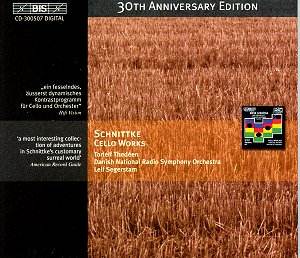The
BIS label have been great champions of Schnittke’s work, and many
of their discs have become ‘benchmark’ versions. There is surely
no better version of the Cello Concerto No.1 than
this expertly played and recorded one. The piece itself is full
of Schnittke thumbprints and is a perfect example of his now familiar
brand of ‘poly-stylism’. One could unkindly summarize this as
‘anything goes’, but that would be unfair. The work is rigorously
structured, with an almost classical proportion to the four individual
movements. One also gets the sense of a ‘proper’ concerto, one
that balances the romantic ideal of interplay and confrontation
between soloist and orchestra, the sense of an epic battle being
fought between protagonists.
This
is evident from the start, where a relatively simple idea on cello
nags away, first being helped along supportively by the huge orchestra,
before unsuccessful attempts are made to crush the soloist into
submission. It is all played out on the broadest of canvases and
at no time is one aware of the music going nowhere – Schnittke
always understood the need for line and direction. The massive,
weighty finale (Schnittke was fond of the ‘big’ finish) has a
real sense of catastrophe, of seismic events out of one’s control.
The playing is superb, with soloist and orchestra in perfect accord
about the ‘meaning’ behind the notes. This is just the sort of
epic, sprawling work that Segerstam is good at taming, and his
composer’s ear never lets him down in terms of balance and texture.
The
beautifully delicate miniatures entitled Sounding Letters
were written for the Russian Alexander Ivashkin (who contributes
to the excellent booklet note) and are the exact opposite of the
concerto. Gone is the rhetoric and sense of the epic, to be replaced
by refinement and limpid delicacy. The change is refreshing.
The
four Hymns combine elements of both preceding works.
They were written over a period and each dedicated to cellist
friends of the composer – Ivashkin again, Karine Georgian (winner
of the 1966 Tchaikovsky competition), Heinrich Schiff and Valentin
Berlinski from the Borodin Quartet. The pieces play well together
as a whole, making an effective cycle full of contrast and variation.
Prayer-like modality juxtaposes with dissonant clusters, the particularly
Russian traits of chant and bell-like processionals underpinning
much of the structure. Above all, Schnittke is able to exploit
the thing which links all four works, the characteristics of the
cello itself, its huge range and individual cantabile quality.
Torleif Thedéen’s performances throughout the disc could
hardly be bettered, and the engineers serve him with a typical
blend of sonic brilliance and musicality.
This
is another clear recommendation for this repertoire and anyone
fancying any of the music need not hesitate.
Tony
Haywood

![]() Torlief Thedéen
(cello)
Torlief Thedéen
(cello) ![]() BIS CD 300507 [70’35]
BIS CD 300507 [70’35]